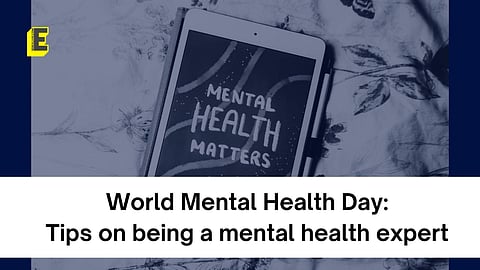World Mental Health Day: Students, want to become mental health experts? Here's what you should know
Today, October 10 is celebrated internationally as World Mental Health Day. This year the World Health Organisation (WHO) amplified the theme of “Mental Health is a universal human right”.
But there can be times when people are borderline ignorant about the services proffered by mental health experts and practitioners, and their service goes unnoticed, given the stigma that still surrounds mental health. A huge consensus of people still are fearful to avail help as they either doubt the nobility of the profession or are still blinded by the prejudice against seeking help, but gradually, the myth is being debunked and more and more people have resorted to seeking assistance.
EdexLive spoke to psychiatrists, mental health experts and counsellors who shared their opinions on how they cope with any transgression that occurs between their professional life and their personal life and debunk myths regarding such topics where the consensus deems that such professionals are in no need of seeking any external help or employ ways to preserve their own mental sanctity.
“Experts, not automatons”
Dr Saras Bhaskar, who is a counselling psychologist based in Chennai, said that one can not be unavailable to their clients as their job requires them to understand their disposition. “My duties warrant me to be productive and cater to them.”
Dr Bhaskar mentions a term called, “Countertransference”, where a therapist begins to identify with the client and cannot provide any justice to their case. During such times, as Dr Bhaskar adjudges, the expert must identify the immediacy of the problem and transfer the case as soon as possible and refrain from involving themselves professionally.
But Dr Lakshmi Vijayakumar, who is the Founder of SNEHA, an NGO in Chennai, is of the opinion that it could rarely happen to a professional as they are trained enough to understand segregation. “We ought to be sympathetic to our clients, but we have an understanding as there is certainly a difference between being empathetic and being over-involved.”
On blurring the lines between personal and professional life, she asserts that experts can readily gauge the warning signs within themselves when such a situation occurs. The person can understand the cause of distress and might constantly worry, but it is always advised to not mentally compromise oneself.
But when it comes to therapy, Aarathi Selvan (she/they), a clinical psychologist and the Founder of Pause for Perspective, thinks that sometimes the narratives of their clients can be empowering and moving. “It is not always that one can maintain an objective distance, given the universality of our concerns yet it is possible not to be involved with their problems.” Harking on the fact that everyone has a common ground, Selvan believes that experts and other individuals have similar concerns and hence, the cause demands that they offer help to whoever seeks it.
But Dr Soumitra Pathare, a consultant psychiatrist and the Director of the Centre for Mental Health Law and Policy, thinks that it is not this problem that mental health experts are plagued by. “We professionals are trained to channelise our emotions but this is not the problem.” He asserts that the challenge that mental health experts in the country face is the lack of awareness when it comes to their profession. He referred to the pressure that one faces due to a shortage of trained professionals and how this cannot be a reason why they are treated as automatons. “We are professionals, but we are human beings too.”
Taking care of oneself
When it comes to segregating the spaces between their professional and personal lives, Dr Bhaskar believes in taking care of oneself. “There can be several factors that can cause cognitive distress and I, too, sometimes seek therapy in order to come to a resolution.” She is of the notion that one can readily seek help, even the experts, if the need arises. Hence, she adds that she sometimes resorts to taking breaks to gain psychological immunity.
Dr Lakshmi Vijayakumar, who is the Head of the Department of Psychiatry of the Voluntary Health Services in Chennai and a member of the WHO’s International Network for Suicide Research and Prevention adds that one should never compromise their own mental health and hence, to prevent this from happening in her own life, she likes to devote some time to nature, “I go for morning walks without my cell phone, listening to chirping of birds and carving out a space for myself.”
Also, self-care does not necessarily mean dissociating oneself socially, Aarathi Selvan said that they would be able to engage themselves in a community of people where they can share their own lived experiences and believe in engaging in practices that support them to feel calm, say either via art or meditation.



